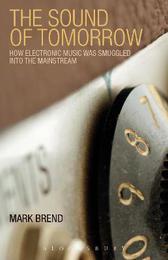
|
The Sound of Tomorrow: How Electronic Music Was Smuggled into the Mainstream
Paperback / softback
Main Details
| Title |
The Sound of Tomorrow: How Electronic Music Was Smuggled into the Mainstream
|
| Authors and Contributors |
By (author) Mark Brend
|
| Physical Properties |
| Format:Paperback / softback | | Pages:256 | | Dimensions(mm): Height 216,Width 138 |
|
| Category/Genre | Theory of music and musicology
Rock and Pop |
|---|
| ISBN/Barcode |
9780826424525
|
| Classifications | Dewey:781.66 786.709 |
|---|
| Audience | |
|---|
| Illustrations |
15
|
|
Publishing Details |
| Publisher |
Bloomsbury Publishing Plc
|
| Imprint |
Bloomsbury Academic USA
|
| Publication Date |
29 November 2012 |
| Publication Country |
United States
|
Description
London, 1966: Paul McCartney met a group of three electronic musicians called Unit Delta Plus. McCartney was there because he had become fascinated by electronic music, and wanted to know how it was made. He was one of the first rock musicians to grasp its potential, but even he was notably late to the party. For years, composers and technicians had been making electronic music for film and TV. Hitchcock had commissioned a theremin soundtrack for Spellbound (1945); The Forbidden Planet (1956) featured an entirely electronic score; Delia Derbyshire had created the Dr Who theme in 1963; and by the early 1960s, all you had to do was watch commercial TV for a few hours to hear the weird and wonderful sounds of the new world. The Sound of Tomorrow tells the compelling story of the sonic adventurers who first introduced electronic music to the masses. A network of composers, producers, technicians and inventors, they took emerging technology and with it made sound and music that was bracingly new.
Author Biography
Mark Brend is an author and musician who lives in Exeter, Devon. His books include Strange Sounds and American Troubadours, and his journalism has appeared in Record Collector, Mojo, Art & Music and many other publications.
ReviewsMark Brend's comprensive history of the process by which what was once the marginalised province of academics and solitary hobbyists gradually became absorbed within the fabric of the musical mainstream throughout the 40s, 50s and 60s is an enthralling and informative read from first page to last...It's an extraordinary story and thanks to Mark Brend it's finally getting the attention it deserves. -- Grahame Bent * Shindig! Magazine * Mark Brend relates the story of how electronic music has infiltrated the mainstream from the turn of the 20th Century, shaping a narrative that rescues its experimentation from highbrow academia, while making the technical accessible to the likes of us whose phones are cleverer than we are.A touching epiloguem reveals how many of these characters have passed on with little mainstream recognition, but Brend's book ensures that their tales are told. -- Jason Draper * Record Collector * Brend thoroughly yet accessibly documents how the [electronic] music sneaked into everyday life as far back as the early 1900s. -- Richie Unterberger * Mojo * Providing a unique perspective, this volume serves as an excellent complement to existing histories of electronic music. In addition, the brief filmography and discography Brend provides with each chapter will be particularly useful for locating some of the less known titles he refers to in the text. Summing Up: Recommended. All readers. -- B. A. Hunter, University of Idaho * CHOICE * Brend relates the story of how electronic music has entered the mainstream from the turn of the 20th Century, shaping a narrative that rescues its experimentation from highbrow academia. It runs alongside the traditional music history, celebrating the people behind the technology that came to push rock music to new horizons. * Record Collector *
|